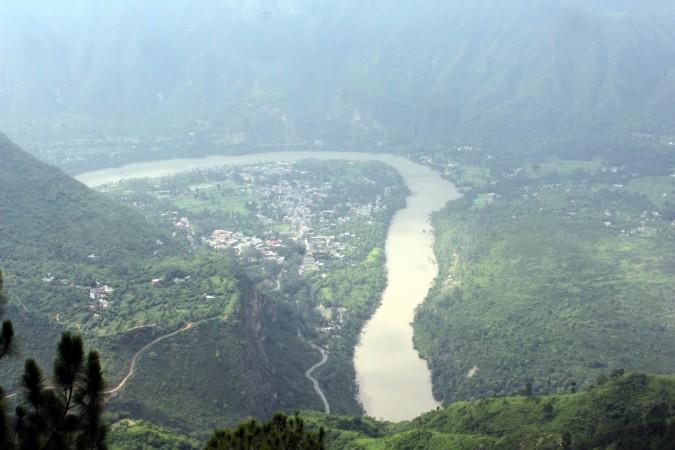
The heavy flow of polluted water released by Pakistan has led to a portion of an embankment along the Sutlej river to collapse in Ferozpur, Punjab. The Punjab administration has put the region under high alert since Sunday, according to reports.
Flood prone villages along the Sutlej river was notified to be evacuated as a precautionary measure by the district administration after the natural creek called Kasur Nallah near Tendiwala village eroded due to excessive flow, government officials told The Indian Express.
The official also said teams of the health department and food and civil supplies department have been deployed. Chief Minister Amarinder Singh directed the Ferozpur DC to keep National Disaster Response Force (NDRF) teams on standby. The army has also been alerted for rescue operations.
Officials have asked villagers of Tendiwala and adjoining 10 villages to evacuate as a precautionary measure. It is reported that in 15 flood-affected villages in Makhu and Hussaniwala districts, nearly 500 persons have been evacuated to safer places.
"Tendiwala is the last village on the border where Pakistan has released excess water via a creek," Ferozepur DC Chander Gaind said, accusing Pakistan of the man-made disaster. "Sutlej water first goes to Pakistan side and later comes back to India. Tanneries in Pakistan's Kasur district release polluted water in this creek."
Fazilka DC Manpreet Chhatwal also blamed Pakistan for the flooding in the region. "Eighteen villages of our district are affected and their geographical location is the reason for flooding as they are surrounded by Pakistan on three sides and there is the little scope of water to drain out," he said.
Superintending Engineer of Drainage Department, Pawan Kapur said that the water levels have increased over the past few years. "Water is coming with high speed and eroding embankments along Sutlej at Tendiwala." The department is working to contain the damages in the embankment since Saturday, he added.
The TIE report suggested that Pakistan's Kasur district which lies 17 kilometres away from the Hussainiwala border of Ferozpur houses over 300 leather production units. Water from units is released into the Sutlej river.
Chhatwal stated that the pollution control department has taken samples of water coming from Pakistan to ascertain what pollutants are coming through the water.
Bilateral water dispute
The issue came to light days after India announced its plans of not sharing hydrological data with Pakistan as per the Indus Waters Treaty (IWT). The water distribution treaty signed in 1960 detailed India's allowance for rivers: Beas, Ravi and Sutlej to flow to Pakistan.
Indian Commissioner for Indus Waters PK Saxena had said that the water agreement renewed every year since 1989, will continue to operate, but provisions such as sharing of information in regard to 'extraordinary discharges and flood flows' will no longer be offered.
![[Representational Image] According to the Indus Water Treaty, India has full rights on the eastern rivers — Sutlej, Beas and Ravi — and must allow unrestricted flow of water of the western rivers — Indus, Chenab and Jhelum — to Pakistan. Picture: A man sits on a boundary wall near the Indus river in Gilgit on September 20, 2012. Indus river](https://data1.ibtimes.co.in/en/full/629827/indus-river.jpg?h=450&l=50&t=40)
Water-related disputes over Sutlej also recently made news after Islamabad accused New Delhi of waging "fifth-generation warfare" and alleged that India released from a dam without informing Pakistan that could have resulted in a flood-like situation.
Pakistan alleged that the release of unexpected water was an "attempt by India to flout the longstanding Indus Water Treaty."
Water and Power Development Authority Chairman Muzammil Hussain told Reuters that Prime Minister Narendra Modi had already "threatened very clearly that he could stop water to Pakistan. He couldn't care less [for] the treaties".
India rejected Pakistan's claims and said the release of water was conveyed to the neighbour's official counterpart and the water reached the threshold level of high flood.
Jal Shakti Minister Gajendra Singh Shekhawat has recently stated that the Indian government is planning to divert the flow of water into Pakistan to allow the water to be used by local farmers, industries and people in the country.
Tensions between India and Pakistan have escalated after New Delhi's decision to abrogate special status of Jammu and Kashmir according to article 370 of the constitution and bifurcate the state into two union territories: Jammu and Kashmir and Ladakh.
Ties between the two countries were already strained after the Pulwama terror attack followed by the Balakot airstrike in February. Following the escalation of tensions between the two nuclear-armed countries, India announced that it had decided to stop its share of excess water flowing to Pakistan as retaliation for Islamabad supporting cross-border terrorism in Jammu and Kashmir.









!['Had denied Housefull franchise as they wanted me to wear a bikini': Tia Bajpai on turning down bold scripts [Exclusive]](https://data1.ibtimes.co.in/en/full/806605/had-denied-housefull-franchise-they-wanted-me-wear-bikini-tia-bajpai-turning-down-bold.png?w=220&h=138)



